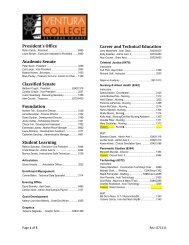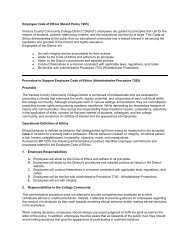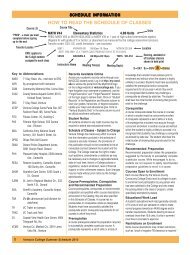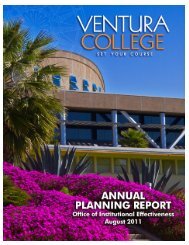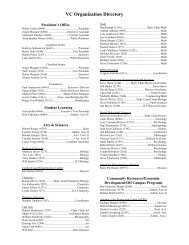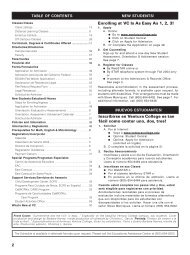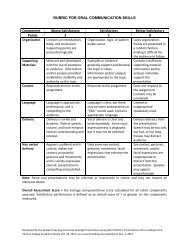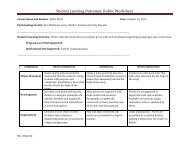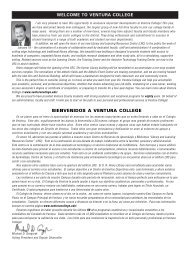2011 General CataloG & announCement of Courses - Ventura College
2011 General CataloG & announCement of Courses - Ventura College
2011 General CataloG & announCement of Courses - Ventura College
You also want an ePaper? Increase the reach of your titles
YUMPU automatically turns print PDFs into web optimized ePapers that Google loves.
APPENDIX II<br />
Student Grievance<br />
I. PURPOSE<br />
Students are encouraged to pursue academic studies and other<br />
college sponsored activities in order to promote intellectual<br />
growth and personal development. In seeking these ends,<br />
students should be free from improper interference by other<br />
members <strong>of</strong> the college community. A grievance may be<br />
initiated by a student whenever the student believes that she or<br />
he has been subject to unjust actions or denied normal rights<br />
as stipulated in college regulations and in the State Education<br />
and Administrative Codes. A grievance may be initiated by a<br />
student against any other student or employee <strong>of</strong> the college.<br />
II. DEFINITION<br />
A grievance is an allegation <strong>of</strong> unjust action or denial <strong>of</strong> student<br />
rights. A grievance exists only when a specific educational wrong<br />
has occurred to a single student. This wrong must involve an<br />
unjust action or denial <strong>of</strong> student rights as defined in a specified<br />
college, college district or superior legal covenant or judgment.<br />
A grievance exists only when such an error or <strong>of</strong>fense has some<br />
demonstrably correctable result. The outcome <strong>of</strong> a grievance<br />
must produce a tangible benefit to the student complaining or<br />
an actual redress <strong>of</strong> the wrong rather than a punishment for<br />
the person or persons found in error.<br />
III. PROCEDURES<br />
A. INFORMAL PROCESSES<br />
When a student believes that a personal injustice has been<br />
sustained, an attempt should first be made to resolve the<br />
concern by informal means. Consultation should be made<br />
with the student, faculty member, administrator or classified<br />
person involved in order to seek direct resolution. If this<br />
process fails or, for some reason, cannot be accomplished,<br />
the aggrieved student should confer with the direct supervisor<br />
<strong>of</strong> the person allegedly causing the problem. If both <strong>of</strong><br />
these steps are unsuccessful, the aggrieved student should<br />
discuss the problem with the Executive Vice President <strong>of</strong><br />
Student Learning or designee.<br />
B. FORMAL PROCESSES<br />
If the aggrieved student believes that the informal consultation<br />
processes mentioned in III.A have failed, the procedures<br />
and rules described below must be followed by both the<br />
student and the college. This process represents the formal<br />
grievance procedure <strong>of</strong> the college. However, the entire<br />
formal grievance process shall be discontinued at any time<br />
the parties can informally agree on a mutually satisfactory<br />
result. All formal records will be destroyed in this instance.<br />
Resolution <strong>of</strong> grievances may not abrogate state or federal<br />
laws and applicable Governing Board rules and policies.<br />
1. A college Grievance Committee shall be established by<br />
the <strong>College</strong> President at the opening <strong>of</strong> each academic<br />
year. This committee shall be composed <strong>of</strong> one faculty<br />
member, one enrolled student and one administrator.<br />
The chairperson will be designated by the President.<br />
Committee members are appointed by and serve at the<br />
pleasure <strong>of</strong> the President. If, in the judgment <strong>of</strong> either<br />
participant in a formal grievance or the President, a<br />
conflict <strong>of</strong> interest or bias exists with any committee<br />
member, that member will be excused and a substitute<br />
appointed for the case in question only.<br />
A formal grievance must be filed with the Executive<br />
Vice President <strong>of</strong> Student Learning or designee within<br />
90 calendar days <strong>of</strong> the final event in a sequence <strong>of</strong><br />
events, if any. The 90-day period shall commence on<br />
the day <strong>of</strong> the event or on the day <strong>of</strong> first knowledge <strong>of</strong><br />
the event by the complaining party. Pro<strong>of</strong> <strong>of</strong> the latter<br />
delayed date is the responsibility <strong>of</strong> the complaining<br />
party.<br />
2. A formal grievance exists when the Executive Vice<br />
President <strong>of</strong> Student Learning or designee receives a<br />
signed written charge specifying the time, place and<br />
nature <strong>of</strong> the injury from the aggrieved student. This<br />
written charge should be dated and must be on behalf<br />
<strong>of</strong> an individual student only. Group or class action<br />
grievances are not permitted. This charge must also<br />
clearly specify the informal consultation attempts made<br />
and described in Section A.<br />
3. The Executive Vice President <strong>of</strong> Student Learning or<br />
designee will verify the completeness <strong>of</strong> the written<br />
charge and present the charge to the Grievance<br />
Committee within ten working days <strong>of</strong> receipt.<br />
4. The Grievance Committee will review the charges made<br />
(Section B.2) within five working days and request a<br />
response in writing from the person accused. This<br />
person must reply within ten working days. Upon<br />
receipt <strong>of</strong> this response, the committee shall meet<br />
and recommend to the President that (a) the case be<br />
dismissed or (b) the reasonable cause for a hearing<br />
exists. This action must take place within five working<br />
days.<br />
5. The President will then either dismiss the case with the<br />
reasons set out in writing to both parties or request<br />
that the Grievance Committee hold a formal hearing.<br />
The President must take this action within five working<br />
days <strong>of</strong> receipt from the committee (Section B.4).<br />
6. Formal hearing procedures:<br />
a. A hearing will be called by the chairperson within<br />
fifteen working days <strong>of</strong> receipt <strong>of</strong> the President’s<br />
request (Section B.5).<br />
b. Both parties will be asked to attend the hearing and<br />
will be given sufficient notice in writing as to the<br />
time and place. Notice shall be given by certified<br />
mail at least five working days prior to the hearing<br />
date.<br />
c. At the time <strong>of</strong> the hearing, the chairperson shall state<br />
the charge. The committee shall hear testimony,<br />
examine witnesses and receive all evidence<br />
pertaining to the charge.<br />
d. Both parties shall have the right to present<br />
statements, testimony, evidence and witnesses.<br />
Each party shall have the right to be represented<br />
by a single advisor but not a licensed attorney.<br />
e. The accused person and/or representative may<br />
be present as well as the aggrieved person and/<br />
or his/her representative. No other persons except<br />
scheduled single witnesses and the Grievance<br />
Committee members shall be present.<br />
f. The person making the charge shall assume the<br />
burden <strong>of</strong> pro<strong>of</strong>. The rule <strong>of</strong> confidentiality shall<br />
prevail at all stages <strong>of</strong> the hearing.<br />
<strong>Ventura</strong> <strong>College</strong> Catalog 2010 - <strong>2011</strong> Appendices 235



